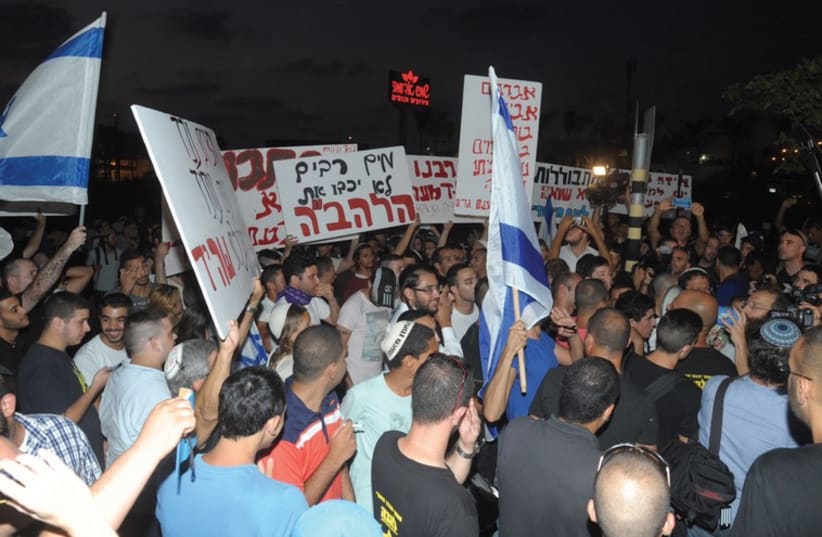I don’t know Mahmoud or Morel and it’s safe to assume that neither do you. You don’t know how they met and why they fell in love. You weren’t there on their first date holding their clammy hands and calming the butterfly flutter in their bellies. You never shared in their dreams or their fights. You don’t know how that twinkle in her Bambi eyes makes his heart skip a beat; or how only his voice can calm her nerves after a long and stressful day.
All you know is that he is Muslim and she was born Jewish and that their marriage makes you feel uneasy.
That’s fine. I accept that because I would never challenge your feelings. They are a product of your values, your worldview and your experiences and I recognize that in my capacity as a total and complete stranger, nothing I can say will compel you to reconsider.
So, why is it that their feelings are up for national, religious and political debate by people with no vested interest in their well-being? And why, particularly at this time?
Mahmoud and Morel are not the first or the last intermarried Jewish-Muslim couple. I personally know a few:
Aurelie, a French Olah came to Israel alone on her 18th birthday. She settled in Jerusalem, where she met Mohammed, six years her senior. The foreignness of the language and culture of her adopted land sent her seeking solace in his arms. She got pregnant long before life had prepared her for the responsibilities of motherhood, or the implications of bringing up a Jewish-Muslim baby in the politically-charged climate of the Middle East.
Today, three years later, their relationship remains largely volatile and is characterized by bouts of abuse, absence and Facebook relationship status changes. Their situation is truly heart wrenching.
I can hear members of Lehava and its proponents smugly proclaiming “I told you so!” The subservience and oppression of women is typical in those neck of the woods, they would say.
But what would they say about Mirit and Khaled, another Israeli-Muslim couple who are a paradigm of love and respect? Mirit and Khaled were raised in very different places; she in uppity North Tel Aviv, he in the east Jerusalem slums. Both, however, were taught to be tolerant and to embrace diversity… and to love food.
Nearly a decade ago, they opened a sushi restaurant in Jerusalem. It closed soon after because it seems they were too ahead of their time for the discerning taste of Jerusalemites, both in terms of their menu and their mentality. Still, that did not dissuade them. They continued their life journey together and eventually decided to put their efforts into sowing seeds of peace through community projects promoting dialogue. Their marriage is a testimony of love and tolerance; and I believe and hope their newborn son will be a legacy of that love and tolerance for a generation that desperately needs it.
If I were to place a wager, I would bet Mahmoud and Morel’s marriage would resemble closer to Mirit and Khaled’s example of love and tolerance. After all, Mahmoud clearly said during the court proceedings to petition against the protests planned for his wedding day that he believes there is nothing better than co-existence; and I trust he and Morel know a thing or two about that as residents of Jaffa.
Still, I don’t believe either of their relationships are a representation nor a result of their religious affiliation.
Let’s be honest here: It would be absolutely absurd to place bets on the anticipated behavior of two strangers based solely on their membership to a religious group. It would be even more absurd to try to influence (read: dictate) their behavior to encourage hostility and dissension- in a democratic country, no less. And finally, the cherry on the absurdity sundae would be to propagate such intolerance in a time when the air is already rife with it.
What Mahmoud and Morel did last Sunday in light of the given circumstances and situation was so brave and so meaningful. They swam together against the violent tide of ignorance and intolerance.
Mabrook and Mazal Tov to both on their courage and their open-mindedness; on their ability to see beyond the lines that divide (literally and figuratively) and nurture the love that unites.
In these times, where all hope seems lost for Israel and the entire region, where hatred is pervasive and perpetual, their marriage as a pure expression of love and tolerance is the olive branch we’ve longed for and nearly lost sight of.
This isn’t to say that we should hold mass intermarriage ceremonies with the promise of peace; I believe in finding a good balance and the time is ripe to get to know our neighbors because we may just like them, or even love them! You might not agree with a syllable I have written until now, but one thing I am sure we can all agree on is that this land, and this world needs more love.
Mahmoud and Morel: Mabrook and Mazal Tov for doing your part to spread the love.Margaux Chetrit is the founder and president of Three Matches, an international dating agency. Her insights on love, sex and relationships are inspired by a career in diplomacy, a panoply of academic degrees and ex-boyfriends. For more of her musings, please visit: or follow her at www.twitter.com/threematches and www.facebook.com/threematches
